Burchell waited seven months in Cape Town before starting his travels largly on the advice of the Klaarwater missionaries. Then it was almost nine months before Burchell could get away from Klaarwater. They arrived Sept 1811. He had to go down to Graaff-Reinet five months later to recruit staff, that took three months. It was some weeks after his return when he could get away finally. When they arrived in Klaarwater the relationship between Burchell and the missionaries started to deteriorate. What was this all about?
Burchell says three men men would be enough as crew per wagon for local travel; 1 leader (person who walks at the front), 1 driver & 1 to look after the spare oxen (1:166). He found soon after leaving Cape Town that his wagon was overloaded to such an extent that it required 14 oxen to draw it through loose sand instead of 10 (1:174) so he bought a second smaller reconditioned wagon in Tulbagh (1:184) which meant he needed double the staff and oxen. He travelled in convoy with two of the Klaarwater missionaries through the Karoo, Anderson & Kramer, who had been in Cape Town. This was both for their party knowing the way across (and most importantly the watering places) and for mutual defence as it was San (Bushman) territory. The San were in conflict with the trekboers both over occupation of the Karoo (particularly east of the Sak river) and for the wild game there. This made the San hostile to anyone in their region. Besides that there was a party of Xhosa who were in rebellion against their chiefs reportedly waiting to ambush them in the Kareeberg (1:185, 1:223, 1:227). The missionaries’ party had extra Khoi & Griqua men who filled in for Burchell for the crossing but they would only be available as far as Klaarwater. Burchell intended hiring people in Klaarwater for his onward travels. When the whole party united (near Fraserburg) there were 97 people in 14 wagons (2 for Burchell, 4 for the missionaries & 8 for the Griquas returning to Klaarwater) (1:266). At Celeryfontein they came across a party of five Xhosas (1:268) who ‘accosted us in an easy manly tone, and with manners perfectly free from servile timidity’ – they turned out to be the ones they had been warned against. Burchell was always disinclined to believe the alarmist reports he was to get throughout his travels.
When they got to Klaarwater Burchell had only 3 men, Speelman & Philip from Cape Town & Gert from Groen Kloof (Mamre) (1:513). He needed 6 more for his journey north. His problems really arose due to an official party sent by the Governor in 1809 to go overland by an inland route to Mozambique had been killed after passing through Klaarwater where they had recruited two locals. (1:50, 1:232 1:498). The missionaries did not want to lose any more of their flock or allow outsiders to influence them.
Burchell had quietly ascertained before they got to Klaarwater that his men were happy to go on a long trek with him as shown in this quote (1:330):
With respect to the long journey before us, none of the men were acquainted with my intentions; and I now thought it time to ascertain the degree of willingness with which they would enter into my plan. Without being directly informed of this, they were told that my object was to penetrate far into the interior of the country, and that we should, most probably, be a long time absent. To this none made the least objection; but, seemingly pleased at the idea of a rambling life, and in high spirits at finding themselves now in the midst of a kraal of people of their own nation, they declared that even a twelvemonth's journey would not exhaust either their patience or their strength. This declaration was most agree¬able and satisfactory, as I had calculated that it would be possible to reach the Portuguese settlements on the western coast, in nearly that time. I distributed amongst them various useful articles, and assured them that whatever could be supplied for their comfort should always be freely given, as long as our stores lasted; and that they would never be put forward into hardships which I would not myself participate in. I thought it proper, while we were on such good terms with each other, to state, without reserve, that, although they might confidently depend on my never feeling dissatisfied with any of them, so long as he conducted himself to the best of his ability and judgment; yet, as it was indispensably necessary for the general safety, that each one should zealously do that part of the duty which had been allotted to him, that they might feel equally certain that I should not overlook any wilful neglect. This mutual declaration created a perfect confidence on both sides; and there appeared to be established betwixt us, a correct understanding, and cordial good-will. To confirm and strengthen this, I permitted them, without restraint, to visit their new friends at the kraal during our stay.
I made that a long quote so that it is complete. Note that they were quite happy to accompany him wherever he was going even if it took a year (although he did not reveal that he intended going to what is now Angola). He sums up the standing between himself & them in the last paragraph. Now read what happened once they were in Klaarwater.
Burchell had the necessary men enlisted before they arrived in Klaarwater but they seemed to change their minds once there. The missionaries had actively (but clandestinely) prevented any of the locals from enlisting to accompany Burchell further (1:517 1:526). He was thus stuck in Klaarwater unless he could make alternative arrangements. Burchell arranged for Gert to go to the Roggeveld with a party about to leave then go by himself to Cape Town and recruit the necessary men & return to the Roggeveld for the return with the same party. Anderson foiled this by lying to Burchell (1:527) saying they were only due to leave in another three weeks time (which would have not left enough time for Gert to get men in Cape Town & meet up for the return journey). Burchell found out he had been lied to later and was still so disgusted by the missionary’s duplicity when he wrote the book that he could only record these events in a particularly dry and brief passage (1:528).
Burchell then came up with the idea of going himself to Graaff-Reinet to recruit staff. Graaff-Reinet is much closer than Cape Town but no one had ever travelled there from Klaarwater. He went to Anderson to tell him of his intention and ask for assistance in recruiting men for this journey. Once more Anderson was duplicitous (1:531, 1:533 1:551) so that Burchell was forced to clandestinely go back to the next village, Kloof, where he managed to get a few helpers (1:542). He had difficulty because most of the available men had left on the Cape Town trip which Anderson had lied about. However he did manage to get some men and returning to Klaarwater the missionaries did all they could to prevent him going (1:551).
The missionaries remained mere lookers-on to my preperations, but not silent ones. They ceased not till the last moment to discourage me from the attempt, and Mr. Anderson seriously asked me to give him a written paper, in which it should be stated that they had used their utmost endeavours to dissuade me from so perilous an undertaking; so that in case of fatal termination, they might stand cleared from the imputation of having contributed to it by any encouragement or advice of theirs.
Burchell’s party of eight (2:139) went by riding oxen & taking pack oxen for their luggage though Burchell himself rode a horse.
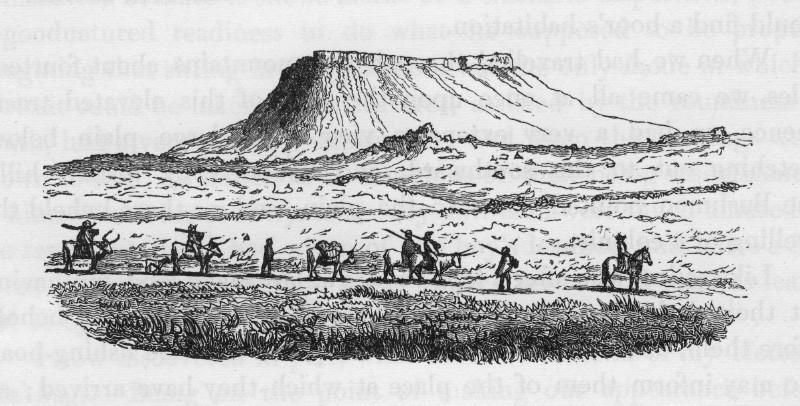
This was a much quicker than going by wagon; he expected to travel 48km per day so it should take him 11 or 12 days each way (1:532). In fact the trip took three months. In Graaff-Reinet Burchell has an official letter from the Governor instructing the landdrost to assist him. The landdrost had recently died and the acting landdrost wanted specific instructions from his distant superiors before he would help Burchell in any way. Later the landdrost arranged for five Hottentots to work for him (2:154). Burchell soon found out that the landdrost had given him the worst of the tronk Hottentors (2:158). Burchell found out about five other tronk Hottentots who were suitable. The landdrost prevaricated about allowing Burchell to have the ones he wanted (2:160). In the end Burchell got one of his selection plus three of the landdrost’s & later he picked up another one (2:166). Eventually the one Burchell selected turns out to be a star & the others awful.
Burchell was the first colonist to travel from Klaarwater to Graaff-Reinet. He had a compass so knew the direction to travel though they followed the Brak river. On this map the middle track is this trip, later on he went to Graaff-Reinet by wagon following the eastern tack. You can also see the Hippo Hunt track. The track to the north is the next posts about Litakun & what I call the Giraffe Trip. Add navigator to Burchell's abilities.
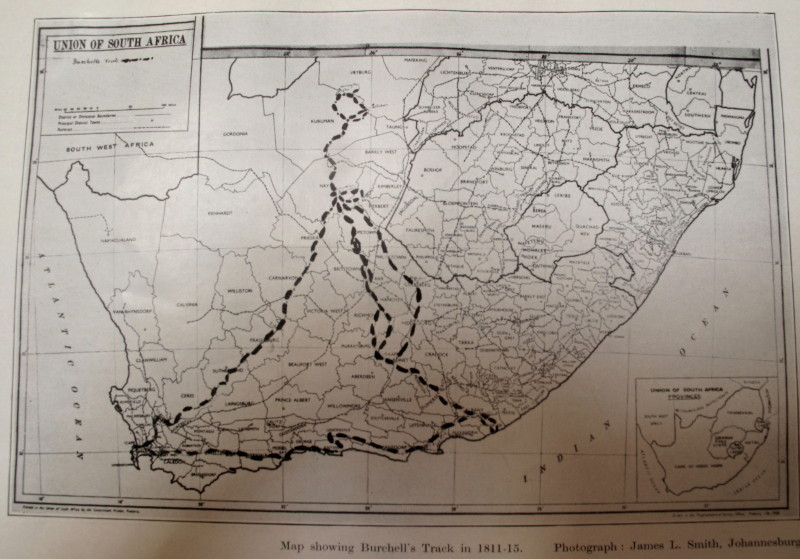
On my bike trip I did not do this leg though I went to Graaff-Reinet when following the later part of Burchell’s travels. They crossed the Gariep at a different place which I went looking for later as well as where they crossed the Sneeuberg. Burchell shot two rhinos along the way. He presented the British Museum with seven rhino skins on his return *source* which included the white rhino he shot near Kuruman which was the first white rhino identified .
Just eighty years after having been "discovered" (near present-day Kuruman) and named by William Burchell in 1817, the white rhino had been hunted so excessively in South Africa and beyond, that just 30 individuals remained in a small corner of Zululand. After the establishment of the Umfolozi Game Reserve in 1897, however, its numbers slowly increased so that by the 1960s, surplus animals were translocated to other reserves so as to ensure the conservation of the species. The Natal Parks Board can rightly claim to have saved this great creature from extinction. Since 1960, over 3 000 white rhino have been released from Umfolozi-Hluhluwe into reserves such as Mkuze, Kruger, Pilanesberg, Phinda Private Game Reserve, Waterberg and Madikwe Safari Lodge. Many of these have subsequently sold rhino offspring to smaller sanctuaries.
*Source*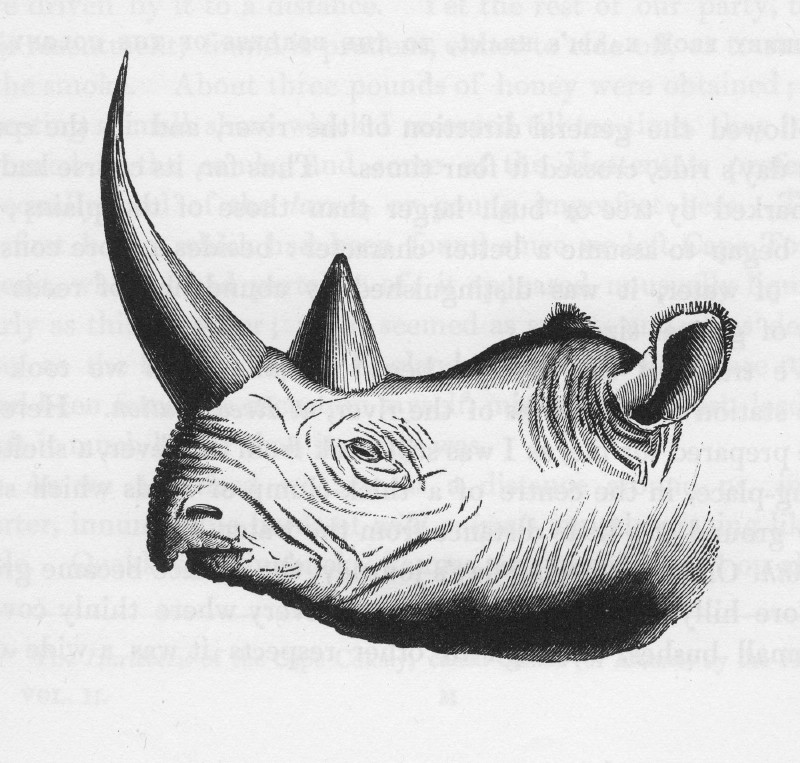
Daniell picture.
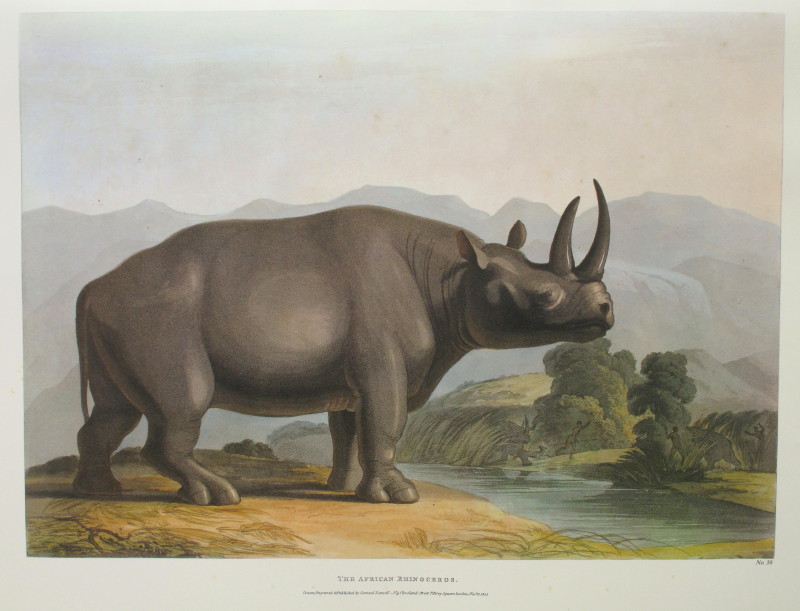
There is one quotation that I must include. Burchell went in a horse drawn wagon after leaving Graaff-Reinet. His observation (2:171).
Our road presented nothing remarkable; or rather, perhaps, the rapid travelling of a vehicle drawn by six horses in hand, left little time for making remarks of any kind. We flew past every object, and, hardly had I turned my eyes to any thing remarkable by the roadside, than it was already behind us. Such expedition was, indeed, a novelty to me, and very different from the rate to which I had been accustomed during the last ten months; but, as a traveller desirous of observing, the features and productions of a strange country, I abhorred galloping horses, and would have preferred sitting behind a team of my own oxen, whose steady pace seemed to have been measured exactly to suit an observer and admirer of nature.
I have a 650 Dakar but prefer the 200 TW for much the same reason (amoungst others).
Burchell’s difficulty in finding workers was no different to what any other employer experienced. There was a shortage of available khoi labourers. The Xhosa had not been subjugated and it was not possible to make a San labour. As a consequence the Cape had to continually import slaves from Africa & India and the East Indies to meet its need for labour. It also resulted in much resentment of the activities of missionaries as they provided shelter to khoi so they were not available as labour.
This is Speelman, the reliable man from Cape Town. He was ex army and became the hunter who supplied the food once they left Klaarwater (2:238).

This is Juli the star from Graaf-Reinet.
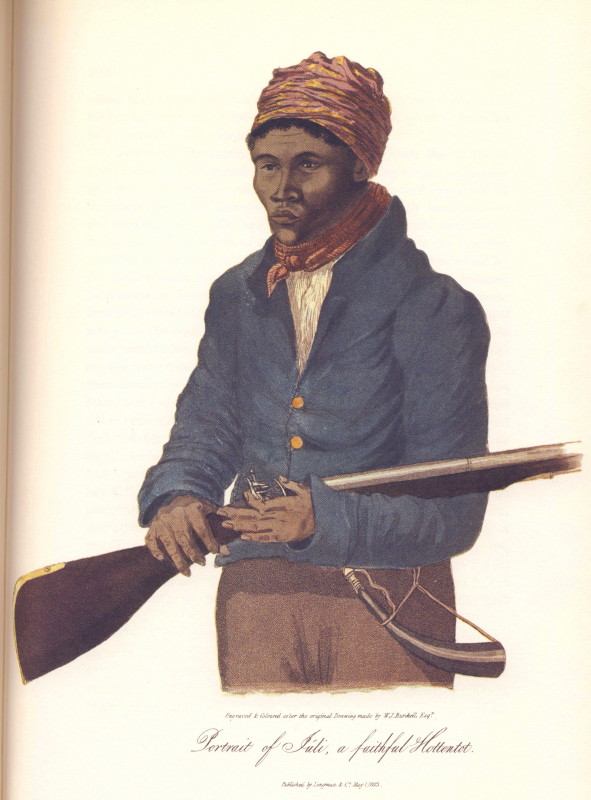


.
No comments:
Post a Comment